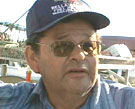|
INTERVIEW
TRANSCRIPT - Gary Housty
It's very scary for the natural environment. We've been very busy through out the winter giving our opinion and have gone to court with the government. We're serious about it and we know that the people do fish farming, even our government, so it's such a weakness. There's too much denial with all the problems with the sea lice and these are all proven things. I don't ever read anything good about it. You know, it's all bad. This is really important for me. I'm still a very active fisherman. I just got in and I just got through unloading one of my very best openings. In the past 4 or 5 years. I've heard that people with their opinions, people from that do fish farming saying that they are of the opinion that the wild stocks are probably never going to come back. Wrong. These past 3 days here show me that they're totally wrong and I always known that. We have to continue to protect our area. This is a beautiful area here. This is the greenest area of forest. Our waters are still pure. We have to keep it like that for generations to come. This is really not about people like myself right now; I work hard all my life. I bought my first boat when I was 18 years old and I'm going to be 58 in August. I know a lot about fishing and I know the damage that fish farming can cause our industry. This is a fishing community. We have our own fish plant that we desperately fight to keep open. I feel really good when I bring in a load of fish and I immediately see 6 people working and are employed by the salmon that I bring in. Fish farming is a nightmare to me. It's a nightmare to my community. We have resources out there that we use; it's not just salmon. We have cod, there's pawns, there's seaweed that we eat. It's really precious to our people. The tides that come from the fish farming take it directly to the area where I harvest for my food. I find that I can't accept that. People coming in, 3rd party people, here to our area are doing this. They come when they have come from another area that they have already destroyed. It's not acceptable. I just feel really strongly about it. I think they should put another moratorium for another year to do further studies because I don't think the studies are right. They have a crippling denial. Lets deal with it. Lets deal with it seriously. Because we have people like Alexander Morton that has been studying sea lice and she's getting in trouble for it. It seems like everything is going backwards here.
No, I certainly can't, because I don't trust our government. I've said this before in one of my speeches that our government shows weakness when dealing with fish farming. I don't think it hasn't changed. They're in the foreign countries, the scientists are very open-minded and they inform us and they tell us and they warn us. They ask 'why are you allowing this to happen in your country when we've done it in our country and we've destroyed it?' 'We're warning you that it is going to happen.' I have no faith in our government for dealing with this issue. That's why we've taken them to court. Molson Falls is now almost completed there. We've been protesting forever since they've started. To me it's the mother of all fish farms. It's going to do a lot of harm to our waters.
I have through out the years. I've caught a few here, which tells you that the farm fish travel a long way. Most farm fish are caught in the Johnson straits. I know for a fact that our neighbors to the north have statements too. We've seen them jumping right outside the pens. Nobody knows what the farmed fish is going to do to our species. There is too much unknown. I'd like to see a one-year moratorium. Let's get down and let's find out for sure what's going on. Let's quit denying all of this. These are big problems.
No one knows what a large escapement of farmed salmon could do to our rivers, to our salmon. No one knows that. To me everything's all guesswork. It seems to me fish farming is immune to DFO regulations. I'm a commercial fisherman. I'm a serious one, I work hard, and I'm going to work hard until I retire because our community needs to work. It's such a scary thing. It makes it really difficult, we love our neighbors from the north. I have great feelings for the people up there. Years ago, when Marine Harvest did what they did in regards to fish farming, it put a big wedge between our two communities. It really hurt. It hurt us. How are we going to mend that? It came so far that it's not comfortable to be in that community any more, even though I want to be. I accept them in my community when they come. Its family we have to accept. We do have our differences, so we have to try and work it out. But, that's what happened when the 3rd parties came in and that's serious.
|
 Gary
Housty resides in Bella Bella, British Columbia. He is a commercial
fisherman and chief in his community.
Gary
Housty resides in Bella Bella, British Columbia. He is a commercial
fisherman and chief in his community.